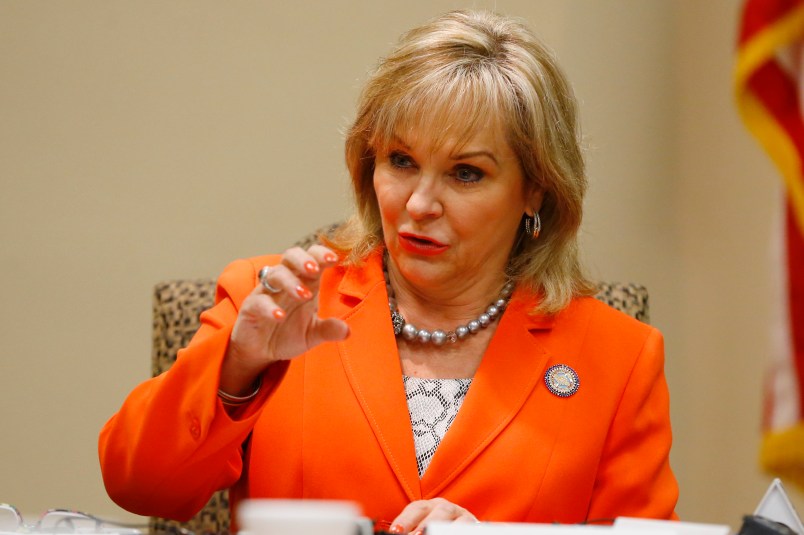Approving legislation that would essentially ban abortion would bring a governor said to be on Donald Trump’s veep list a costly court battle for a cash-strapped state and a lot of negative attention.
Will Oklahoma Gov. Mary Fallin (R) sign it anyway?
In some ways, the choice she faces has become somewhat commonplace in the governors’ mansions of red states across the country: Greenlight an obviously unconstitutional anti-abortion bill passed by a Republican legislature and invite an expensive court legal battle, or save the state the trouble by vetoing it at the risk of ticking off the social conservative base.
Since taking office in 2011, Fallin has largely chosen the former route. But this time around, the decision brings an extra set of complications. Oklahoma is currently facing a major budget crunch, and Fallin herself has attracted national attention for her early support of Trump, making her subject of vice presidential speculation.
The bill would effectively ban abortion in the state, in direct contravention of the Supreme Court’s Roe v. Wade decision, which called the right the terminate a pregnancy pre-viability a constitutional right. The Oklahoma legislation appears to make it a felony for physicians to perform abortions. Their medical licenses would also be revoked, unless the abortion was to save the life of the mother.
The measure passed its final hurdle in the legislature Thursday morning, and now heads to Fallin’s desk for her approval.
The legislation is such an obvious target for litigation that one of its sponsors had to tell his colleagues to basically just ignore the fact that it could be struck down in court.
“I’ve heard almost every argument today about judicial challenge to this legislation and after much prayer and study, I ask myself this question,” state Rep. David Brumbaugh (R) said during a floor debate on the bill last month. “Do we make laws because they’re moral and right, or do we make them based on what an unelected judicial occupant might question or overturn?”
Concerns over a bill’s constitutionality hasn’t stopped Oklahoma from moving forward with anti-abortion legislation in the past. Under Fallin’s tenure, the state has enacted 18 bills that restrict access to reproductive services, according to the Center for Reproductive Rights, which leads the litigation efforts of the abortion rights movement.
About half of those laws have been the subject of legal challenges, and some of those laws were indeed knocked down by courts. They include a 2011 measure that essentially banned medication abortion (called unconstitutional by an Oklahoma Supreme Court), a 2013 law that placed restrictions on emergency contraceptive access (struck down a year later) and a 2015 law that banned a method of abortion commonly used in the second trimester (blocked by a state court in October).
A 2010 law that required women seeking an abortion to undergo a narrated ultrasound was also declared unconstitutional by Oklahoma’s Supreme Court.
“We are looking at this law very closely,” Julie Rikelman, litigation director for the Center for Reproductive Rights, told TPM Thursday after final passage of the bill. “Because it if is signed into law, it will be the most extreme abortion ban in the country in years and clearly unconstitutional.”
Back in the early 1990s, Louisiana and Utah both passed abortion bans similar in scope that were ultimately discarded because they were found to violate the constitution.
More recently, Rikelman said, “We have been seeing more and more bans on abortion, and they’ve been getting earlier and earlier.”
She pointed to Arizona’s 20-week ban, Arkansas’s 12-week ban and North Dakota’s ban at around six weeks into the pregnancy.
“All of those laws were challenged and the courts struck all of them as unconstitutional, but this would be even more extreme,” she said.
All this comes as the state is feeling the crunch of a budget shortfall that amounts to nearly 20 percent of last year’s spending. With the specter of adding an expensive court fight to that deficit, Brumbaugh had to address that, too.
“Everybody talks about this $1.3 billion deficit,” state Rep. David Brumbaugh (R) said, before invoking a saying he attributed to a friend: “If we take care of the morality, God will take care of the economy.”
Fallin has remained mum as to whether she intends to sign the abortion ban.
“We haven’t had a chance to review the bill yet,” Jay Marks, a spokesman for the governor’s office, told TPM after it passed, adding that he expected it to be delivered to the governor’s office Thursday afternoon.
Asked about the concerns over a lawsuit, Marks said it would be part of the review by the governor’s staff.
“That’s always part of the equation,” Marks said. “Making sure we’re not making more problems than we’re solving with any piece of legislation.”
Fallin’s deliberations will also occur with her under a national microscope, as she was an early cheerleader of Donald Trump, who is weighing his vice presidential options. Trump called the suggestion of Fallin as VP “great” advice and has floated her name since. Fallin, in turn, said she would “honored” to join his ticket.
She will have five days to choose to act on the abortion ban, starting from when it was delivered to her office. If she does nothing, it becomes law automatically, and an expensive court battle will almost surely follow.










